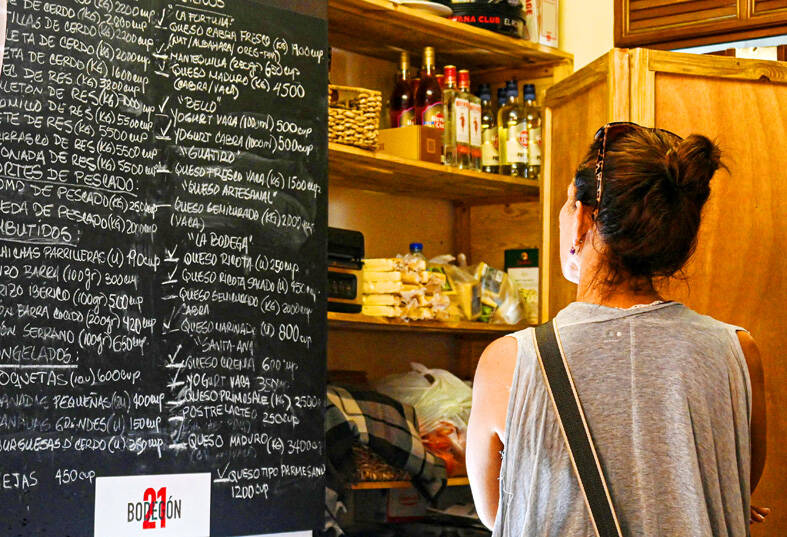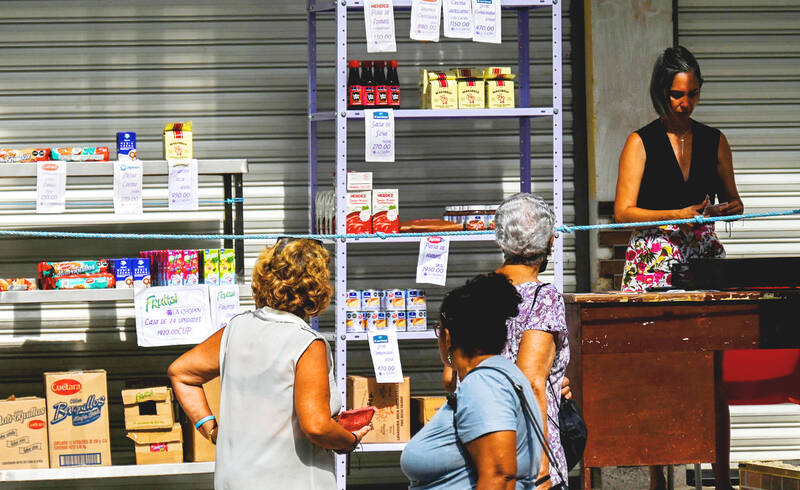Like mushrooms after the rain, small stores are springing up all over Havana, many run from homes or garages as the private sector finally gains a foothold in communist Cuba.
Small businesses, only authorized in 2021, are mounting a challenge to companies run by the one-party state which are emptier every day as Cuba battles a shortage of foreign currency and sky-high inflation amid its worst economic crisis in 30 years.
From garages, porches or small rented shops, Cubans sell anything from beer and sweets, meat, dairy and groceries that are becoming increasingly difficult to find elsewhere.

Photo: AFP
“If you need something you can’t find [in the state-run stores], they have it. They have the things you need,” Maria Leonor, 73, said as she emerged from one of the new private outlets.
After six decades of exclusively state-owned commerce, in August 2021 the government approved a law approving small and medium enterprises.
The sea change came as Cuba reeled from the aftereffects of the COVID-19 pandemic, which flattened its critical tourism industry, and the tightening of US sanctions.

Photo: AFP
At the neighborhood store El Bodegon 21, a colorful array of products are arranged prettily on wooden shelves — a stark contrast to the monotony of indistinguishable cans and empty refrigerators in gray-hued state shops.
For customers like Leonor, these new stores offer a chance to find products, like yogurt, missing from the official market.
An added benefit: Cubans can buy at the private stores with the local peso, while government stores require payment in foreign currency, which is hard to come by.
The downside is that prices are “quite high,” Leonor said.
A kilogram of milk powder sells in a small private store for about 2,000 pesos — just less than half the average monthly salary. Before, it was only available on the black market, long absent from government shops or the “bodegas,” outlets where Cubans have access to a limited selection of subsidized products through ration books.
In May last year, US President Joe Biden had pledged to “increase support for independent Cuban entrepreneurs” and help the private sector grow.
A year later, last month, hundreds of Cuban tradespeople sent the US leader a letter urging him to follow through on this promise.
They asked him for nonimmigrant visas to permit them to travel and acquire supplies, to allow access to payment platforms such as PayPal, the right to set up US bank accounts, and the reopening of US tourist travel to Cuba.
Omar Bouso, 27, is among those trying to make a living under the new rules that have given rise to some 7,800 private small and medium-sized enterprises in almost two years. He lost his work in a restaurant that closed during the pandemic, then opened a Hawaiian fast-food restaurant with two friends, which they run from a private home.
“We found a niche in the market to do something different,” he said.
Entrepreneurs such as Bouso get their goods from private import companies that did not exist until recently.
A UN report showed that about 22 percent of Cuban small enterprises are in construction, 19 percent in gastronomy and tourist accommodation, 12 percent in industrial food production and less than 3 percent in trade.
Inflation, which the government says could reach 39 percent this year, but analysts say would surpass 100 percent, hits the public and private sectors alike.
Cuban Minister of Economy and Planning Alejandro Gil recently sought to clear the government of blame for high prices. In a parliamentary session, he pointed the finger at the private sector.
“We are not expecting of anyone to work at a loss, but it is not possible to make a fivefold profit so fast,” he said.
Gil also defended state-owned companies, which he said “are not making a profit and pay minimum salaries so as not to increase prices to the population.”
The state sector continues to carry the economy and employ almost two-thirds of workers, a regional UN commission said.
Oniel Diaz, founder of private business consultancy Auge, said that many of Cuba’s problems can be addressed with responsible regulation, but added that the purpose of small business would always be to “generate wealth.”

Taiwanese suppliers to Taiwan Semiconductor Manufacturing Co. (TSMC, 台積電) are expected to follow the contract chipmaker’s step to invest in the US, but their relocation may be seven to eight years away, Minister of Economic Affairs J.W. Kuo (郭智輝) said yesterday. When asked by opposition Chinese Nationalist Party (KMT) Legislator Niu Hsu-ting (牛煦庭) in the legislature about growing concerns that TSMC’s huge investments in the US will prompt its suppliers to follow suit, Kuo said based on the chipmaker’s current limited production volume, it is unlikely to lead its supply chain to go there for now. “Unless TSMC completes its planned six

Intel Corp has named Tasha Chuang (莊蓓瑜) to lead Intel Taiwan in a bid to reinforce relations between the company and its Taiwanese partners. The appointment of Chuang as general manager for Intel Taiwan takes effect on Thursday, the firm said in a statement yesterday. Chuang is to lead her team in Taiwan to pursue product development and sales growth in an effort to reinforce the company’s ties with its partners and clients, Intel said. Chuang was previously in charge of managing Intel’s ties with leading Taiwanese PC brand Asustek Computer Inc (華碩), which included helping Asustek strengthen its global businesses, the company

Power supply and electronic components maker Delta Electronics Inc (台達電) yesterday said second-quarter revenue is expected to surpass the first quarter, which rose 30 percent year-on-year to NT$118.92 billion (US$3.71 billion). Revenue this quarter is likely to grow, as US clients have front-loaded orders ahead of US President Donald Trump’s planned tariffs on Taiwanese goods, Delta chairman Ping Cheng (鄭平) said at an earnings conference in Taipei, referring to the 90-day pause in tariff implementation Trump announced on April 9. While situations in the third and fourth quarters remain unclear, “We will not halt our long-term deployments and do not plan to

The New Taiwan dollar and Taiwanese stocks surged on signs that trade tensions between the world’s top two economies might start easing and as US tech earnings boosted the outlook of the nation’s semiconductor exports. The NT dollar strengthened as much as 3.8 percent versus the US dollar to 30.815, the biggest intraday gain since January 2011, closing at NT$31.064. The benchmark TAIEX jumped 2.73 percent to outperform the region’s equity gauges. Outlook for global trade improved after China said it is assessing possible trade talks with the US, providing a boost for the nation’s currency and shares. As the NT dollar